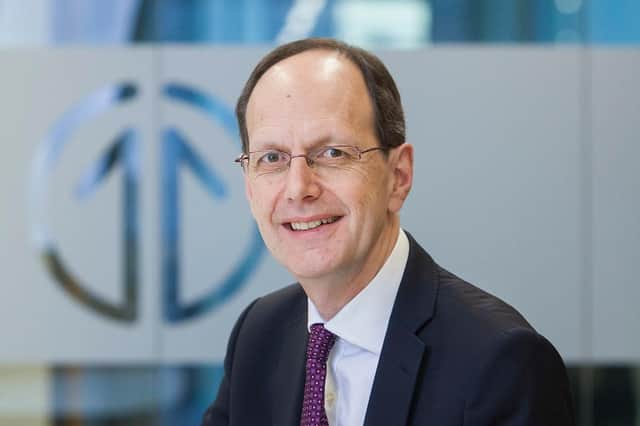Outgoing transport boss claims infrastructure boost could create 800,000 jobs in the North


And John Cridland, who last month ended his term as chairman of Transport for the North (TfN), has also spoken of the specific challenges facing people living in Northumberland and why he moved to the county.
The Government’s flagship ‘Levelling Up’ agenda has made much of plans for big-ticket, big-spending projects intended to shift the focus away from London. Mr Cridland says the promised investment will be vital in taking ‘Northern Powerhouse’ from buzzword to reality.
Advertisement
Hide AdAdvertisement
Hide Ad“A bit over a century ago, we were the powerhouse,” he said, speaking from his home in Berwick. “Look at the North East, we were the place where things were made, where raw materials were mined, where ships were built – it wasn’t London.
“London might have been where decisions were made and where financial capital was, but the north of England and the North East were where things happened.
“We’ve lost that, the world’s moved on, the pits have closed, the shipyards have been reduced and there are lots of people across the north who can’t achieve their potential, because they don’t have the assets that they need to do that.”
The ability of transport to ‘liberate’ people is a key theme for Mr Cridland, who, as a board member at education watchdog Ofsted, knows how vital it can be in enabling access to training and education.
Advertisement
Hide AdAdvertisement
Hide Ad“It also means workers find it harder to seek better and better-paid jobs elsewhere, something they have much more opportunity to do in London and the South East.
“[At TfN] we spent a lot of time asking ‘what’s the North good at?’ not ‘what does the North need?’.
“We’re very good at advanced manufacturing, we’re very good at low carbon energy, we’re also very good at digital business and we’re very good in life sciences and health innovation.
“If you better connect those economic assets, we estimated, you could create £100billion of gross value added, over a generation, and create maybe 800,000 jobs.”
Advertisement
Hide AdAdvertisement
Hide AdThe importance of advanced manufacturing is hit home by the presence of the Nissan car plant and International Advanced Manufacturing Plant (IAMP) in Washington, the country’s fourth largest town without a direct railway link, despite long-standing ambitions to connect it to the Tyne and Wear Metro – which Cridland calls a ‘fantastic’ asset for the region.
It’s the type of thinking which helped him catch the ear of then Chancellor George Osborne, while he was director general of the Confederation of British Industry (CBI), a business lobbying group.
While the David Cameron years may have left a mixed legacy, Mr Cridland is at least confident he and Osborne were ‘sincere’ in their efforts to boost northern England’s economy.
“For most of the time George Osborne was chancellor, we were struggling to recover from a really deep recession caused by the financial crash,” he said.
Advertisement
Hide AdAdvertisement
Hide Ad“The problem was the recovery took a long time to gain momentum because the banking crisis had done such serious damage to the heart valves of the economy.
“Before the financial crash we’d been too dependent on financial services and the City of London, so the chancellor needed new areas of growth.”
After almost 30 years with the CBI, initially joining as a policy advisor in 1982, moving into the hot seat at the fledgling TfN was a ‘logical step’.
Plans to move to the coast saw him settle on Berwick because “frankly I like the Northumberland coast better than any of the others,” but also gave him a greater appreciation of the transport challenges facing northern England.
Advertisement
Hide AdAdvertisement
Hide AdHe said: “If I need to go to A&E, I have to go to Cramlington, which for me is a 128-mile round trip and I can only really do it by car.
“So getting around Northumberland, a beautiful county that I love living in, is genuinely difficult and we have to tackle those challenges.”
As well as individuals, it’s also a problem he knows businesses face, particularly if Brexit means firms conditioned to think trade should head east, to Europe, now need to send it in the opposite direction.
He admits addressing such problems was not always easy and his time at TfN was marked by a timetabling crisis in Manchester and uncertainty over the future of the HS2 and Northern Powerhouse Rail projects.
Advertisement
Hide AdAdvertisement
Hide AdThere was also the failure to come up with a plan for public transport smart ticketing across the region, something he calls “frustrating and disappointing” and prompted envious looks at the powers available to the likes of London Mayor Sadiq Khan.
But despite this, he believes his stint at the body has produced a strong innings which his successors can build on to make ambitions a reality.
And if it does, he’s confident the effects will be wider than just more jobs.
“It can liberate people, it can give them more options,” he added.
Advertisement
Hide AdAdvertisement
Hide Ad“It might be about going to the theatre in Newcastle as much as it might be about going to college, and that’s just as important.
“Self-evidently, some of us choose to live up in the North East [because of the] quality of life, which is about earning power, but also the fantastic cultural heritage that we’ve got here.”
James Harrison, Local Democracy Reporter